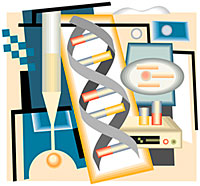Campus News
CAS Fellows Discuss "Designer Babies" at Inaugural Event
by Kathy Gersowitz (January 30, 2006)
 |
 |
| Bonnie Steinbock |
More than 30 University at Albany College of Arts and Sciences Fellows, selected for their commitment to the arts and sciences, gathered Dec. 14 for dinner, a lecture, and discussion of "Designer Babies" at the Life Sciences Building for their first meeting.
Dean Joan Wick-Pelletier welcomed the group, which included professors emeriti, business leaders, and members of the arts and sciences community. "Our concept of the relationship between fellows of the college and the college is one of intellectual and cultural reciprocity," said Wick-Pelletier. "Since arriving at the college four years ago, I have had the opportunity to meet and get to know so many individuals in our community who view the academy as a conduit to enrich their intellectual lives. The opportunity for faculty, students, and our surrounding community members to interact enhances all of our lives." Many British and Canadian universities have strong fellows programs, enriching both the university and their community, she added.
Professor Bonnie Steinbock of the Department of Philosophy shared her expertise in the area of bioethics, particularly reproduction and genetics. According to Steinbock, the term "designer babies" has been used in the media to express the idea that one day prospective parents will have the ability to choose the traits they wish their children to have. Of course, parents already try to influence their children's traits on a regular basis by feeding them healthy food, sending them to school, and disciplining them. Thus, Steinbock argues that it is not trying to shape a child's traits, either by traditional or genetic means, that is objectionable, but rather "a certain style of parenting which is not unique to genetic enhancement" that is. She referred to this style as "hyperparenting."
"There are many roadblocks to genetic enhancement, but what if it were possible to give our children a genetic edge?" she wondered. "Would that be a bad thing?" Steinbock said the biggest problem with genetic enhancement is the parents who would be willing to go to great lengths and spend vast amounts of money to design "the perfect child." In these extreme cases, parental tyranny would not allow a child to follow his or her own dreams. "Part of being a good parent is being able to value the characteristics your children have, even when they're different from the ones you expected or would prefer. The objection is not to designer children, but to designing parents," Steinbock said.
She went on to say that through the process of selecting a partner, we take an active role in determining the genetic makeup of our children. She was quick to point out, however, that our genes do not solely determine who we are or who we will be. "What we look like, how smart we are, and what talents we develop, are a result of multiple causes, not just our genes." A lively discussion followed her presentation.
The formation of the CAS Fellows is a result of a recommendation in the 2003 College Strategic Plan. Fellows are defined as individuals "who have taken an interest in the college and wish to enjoy the stimulation of intellectual discussions that only the liberal arts and sciences can provide." CAS Fellows are nominated through the CAS departments and dean's office, and their nominations are then reviewed by a committee.
Fellows are invited to come to the campus to attend lectures, plays, film screenings, or performances, as well as special events, such as the December lecture. "The goal of the College Fellows is to provide a vehicle for these individuals to become more engaged with the college and University. We hope to be the bridge between the College Fellows and our faculty and students, and at the same time we expect to gain from their wisdom and expertise," said Wick-Pelletier.
There are currently more than 50 CAS Fellows.
For more information on the CAS Fellows program,
contact (518) 442-4651.
